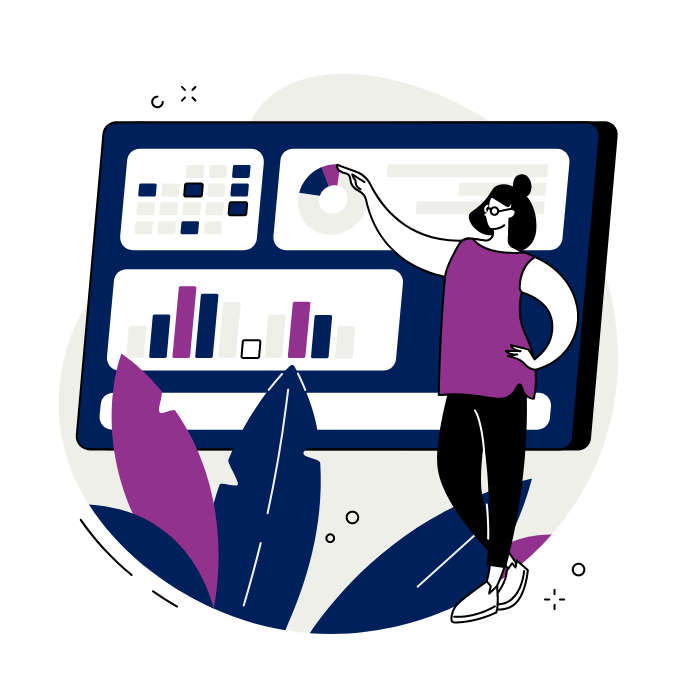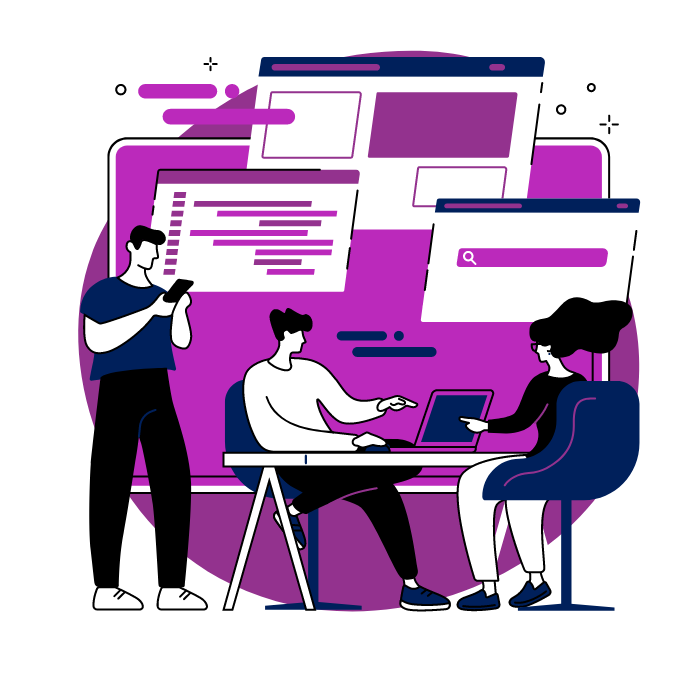Professor Alison Clark-Wilson is one of the world’s foremost minds when it comes to technology and education. We highlight some of her career milestones and take a big-picture snapshot of her thoughts on the current state and role of EdTech.
A former high school maths teacher in the United Kingdom, Professor Alison Clark-Wilson’s time at the front of a classroom began in the early 1990s; an era in education when having just one computer in the corner of a secondary school classroom — let alone an entire computer lab — was considered the cutting edge of EdTech.
In the 30-something years since, she has seen firsthand a technological evolution that’s gone from hacking early computers into televisions (just to try and get a bigger display in a classroom) into an industry tipped to be worth more than €277 billion by 2029 ($US300 billion/$A450 billion). It’s an industry that Alison has undoubtedly helped shape along with a range of other fellow academics, tech entrepreneurs, global software companies and, of course, students.
Alison’s career trajectory has involved consulting, researching and evaluating a range of EdTech projects; a stint on the Executive Committee of the British Society for the Learning of Mathematics; and authoring a series of books that included two editions of The Mathematics Teacher in the Digital Age (with Ornella Robutti and Nathalie Sinclair), part of the highly successful Mathematics Education in the Digital Age Era series.
Since joining University College London’s Knowledge Lab in their Institute of Education in 2013, she has been instrumental in initiating the European EdTech Network — linking EdTech experts and innovators, higher education professionals and students with some of the most creative minds in Europe to drive world-leading EdTech innovation.
Alison was also Principal Research Lead for the EDUCATE Project at the UCL Knowledge Lab; a project that was designed to break down the barriers between the educational research community, and its knowledge base, and industry.
Why engineering’s loss was education’s gain

Born into a working-class family in London, Professor Alison Clark-Wilson is the middle of three girls, something that had a major role in forging her future path. Her family of ‘tradies’ brought home attitudes and cultural mores that had a profound impact on her domestic life.
“I had a Dad who was really quite a chauvinist when I look back,” she laughs. “I think the fact that I didn’t have a brother completely shaped my life because I became my father’s surrogate son. I got dragged along to help mend the car and so on, and so I developed a real interest – a real curiosity – in technology quite early on in my childhood.”
The first in her family to attend college, Alison earned a chemical engineering degree straight after school but quickly became disillusioned upon entering the workforce. Describing engineering as a “hostile environment” for women at the time, marriage and starting a family presented a much more appealing proposition for Alison. It was a decision that would also change the course of her career.
“I knew I was going to go off and do something,” she explains. “I trained to teach maths in the secondary school system in the early 1990s when my kids had just started in school, and I hit my teacher training at a time when digital technologies were really coming into school classrooms. We’d gone beyond very expensive mainframes, and affordability was making it possible to get a computer in the corner of a classroom and do stuff with it. So, being curious and always pretty creative, I was up for the challenge.”
In an era of computing before accessories like a mouse and graphics cards – and when storage systems maxed out in kilobytes, not terabytes – Alison’s engineering-trained mind gravitated towards big picture questions about technology and learning. What could this combination offer teaching? What could students and schools do with it?
“We really had to get into the nuts and bolts of things,” explains Alison, “but that set the path for me because I got spotted by a few tech companies, as well as the part of our education department that was looking at innovation. I became one of the go-to classrooms for a lot of people who wanted to pilot stuff.”
“I worked out what the deal was back then, which was I give a bit of my time and creativity and thoughts, and they give me a free kit. So, I ended up having a classroom that got to pilot technology that wasn’t on the market yet,” she recalls the quid-pro-quo between her and multinational tech companies such as Casio, Hewlett Packard and Texas Instruments.
Before too long, the challenge to develop the first digital mathematics curriculum for UK schools Research Machine’s MathsAlive! was on the table. The team was looking for a teacher to be seconded to a university to help author the text. This was an opportunity that Alison didn’t hesitate to jump at and embrace with great gusto.
One of the major things Alison took away from the project was the importance of professional development in EdTech to achieve baseline standards of digital literacy. She reasons that schools may have all the ‘bells and whistles’ of features in their platform, but it won’t matter in the slightest if the people using it aren’t helped to learn how it works.
“I was in that class of innovators who all thought, ‘Okay, everybody’s going to love this programme’ and, of course, five years later when we looked back on this project, we were asking why teachers weren’t using it. Here’s this amazing digital curriculum, so what’s going on here? And that was when my interest started to turn to some of the challenges around supporting teachers with their professional needs to stay abreast of these new technologies.”
“Never mind becoming superstar experts,” she continues. “We had hordes of teachers who’d never even sent an email, never actually gone on the internet. So, part of a huge initiative we had in the UK was the first big digital upskilling of the education workforce, and that’s when I shifted to looking at what professional support might look like.”
The power of teachers in influencing EdTech

One of the most interesting insights Alison takes from her career journey is how effective teachers can be as a resource for Edtech companies looking to develop or improve their platform. While many organisations focus their efforts on wowing a school or an education department’s procurement team, they’re often unaware of what teachers, parents or school leaders might be truly looking for – the customer or user experience.
“What we know from a lot of studies is that the school leaders and school colleagues talk to each other, and they get recommendations from each other,” explains Alison. “Basically, it’s as simple as ‘if it works in a school down the road that looks a bit like mine, then, you know, I might have a look at it’,” she laughs.
“They bypass all those other marketing routes, and it kind of goes by word of mouth. So, if you’re an EdTech company and you want to scale your product – or you want to find more pilot sites or you want to go to a new market – you have got to find your teacher champions,” she continues.
“I was a teacher champion for many companies and products over my career, and what I did was talk to other people. You go to conferences; you speak about it. You go to meet-ups for teachers, and you speak about it. Throw your marketing and sales money at supporting the teachers because they will become your best advocates. They will also be your best feedback route to improve your product.”
“It’s not always about sales; it’s about telling a really strong story about why your product is going to be impactful in the way you think it should be – and doing that through the teachers, students and whoever else is using it. That, in turn, builds teacher community and helps to make that connection. We get better products because you’re closer to the people that you are designing for.”
An expert’s thoughts on the future of EdTech and learning

No matter what the industry, maximising employee productivity and creating efficient workplaces dominates the way we work, and the decisions organisations make. The education sector is no different.
Alison claims, currently, most school education systems around the world plan every minute of a child’s time in school to fit the national curriculum, and there’s nothing to spare. She believes the growing trend of using EdTech for teaching to ensure students pass tests poses a threat to learning.
“There’s no innovation time; not only innovation for learning but also innovation for teaching,” Alison explains. “Seymour Papert, who was very much the father of educational technology in my book, always thought 20 percent of class time should be there for creative innovation that isn’t going to be examined. That gives both teachers and learners time to play; time to innovate; time to pick up new technology they haven’t used before and learn together, iterate together and create stuff together.”
She passionately believes it’s well past time to “rethink how we can approach our education in a way that values what every child brings, what every teacher brings, and then put resources around that to enable them to really thrive and be happy.”
“We definitely need to lock down creativity time in our school curricula,” Alison says.
“If there is one word I could eradicate from the education system, it’s the word ‘deliver’. We deliver lessons? No, we do not deliver anything! We offer it,” she laughs. “Delivery is the mantra: ‘I’m a good teacher, I did it!’ Well, I’m sorry, you didn’t do it unless they learned how to think. We need to reclaim the word ‘teach’ rather than ‘deliver’. We need to be mindful of the opportunities we provide for children to learn, and we need to maximise those opportunities such that they take them up. Because if they don’t take them up, then we’ve wasted our time.”
“We need to somehow be a little bit more humble about what’s possible and bring the kids with us,” she concludes. ”I mean, they arrive as beautiful, enthusiastic four or five and six year-olds, and they can leave as quite disillusioned 16, 17, 18 year-olds. We could definitely do better.”
We need to reclaim the word ‘teach’ rather than ‘deliver’. We need to be mindful of the opportunities we provide for children to learn, and we need to maximise those opportunities such that they take them up. Because if they don't take them up, then we've wasted our time."
Professor Alison Clark-Wilson



